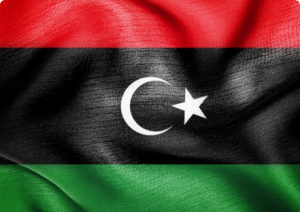The current political scene in Libya is buzzing with political activities like never before; political parties were banned under the Gaddafi rule, as he claimed power to the people, and his idea of the "state of the masses". After the successful campaign to oust Gaddafi out of power, the political scene in Libya is being reborn with different political groups, civic organisations and wide range of political ideologies.
There are various parties and movements in the political scene in Libya, ranging from moderate Islamic groups to fundamentalists, and from liberal, secularists groups to regional and tribal loyalties. There was substantial opposition to the rule of Gaddafi, but that opposition was based entirely outside Libya, and it is hard to assess the political influence this opposition will have in the new Libya, while bearing in mind that the leaders of this opposition have been outside Libya for a long period of time, and some of their critics claim they are detached from the Libyan society. This claim was somehow substantiated in the Libyan Elections Law 2012 that states people with dual nationality cannot run for the coming elections to elect the National Assembly, unless they drop their other nationality. However, there are few very effective players in the political scene in Libya and they fall in five different categories.
First, the royalists and these are calling for the Sanusi Monarch to be restored in Libya. They claim that the Sanusi Monarch was the legitimate authority in Libya and Gaddafi and his movement rebelled against this legitimate authority to establish the Jamahiriya. There is an ever growing popularity for this movement, and that was evident in the meeting that took place in Albyda city in the green mountain where leaders of some of the tribes called for the crown prince to lead Libya or declare independence of Cyrenaica under the rule of the crown prince. The amount of support for such a move remains to be determined.
Second, the nationalists' movement, which was formed in the 70s of the previous century and of which Gaddafi, was a great advocate and supporter until he decided to give up on Arabs and change his plans of unity to Africa. Although many claim that the nationalists' movement is very weak and has been since the early years of the 90s of the previous century. However, there was a clear signal from the new Tunisian president Mounsef Almarzogi while visiting Libya about his ambition and dream to see the Egyptian, Libyan and Tunisian unity come to realization and becomes a reality. However, each of the three countries is facing huge political, economic and social challenges and that makes any work towards unity a complex and huge challenge.
Third, the Islamists' movements and these are usually classified as moderate such as the Muslim Brotherhood and Sufism, or fundamentalists such as the Islamic fighting group and many other extremists groups. The extremists groups are mainly based in the east of Libya in cities like Derna and Albyda and the green mountain area. Such groups have proved their ability to disturb any political regime in any country if they don't get their way (i.e. apply the Sharia laws in an extreme manner). There are huge speculations about the role and influence such groups will play in the new Libya.
Fourth, the Liberal movements and the most known of these is the Democratic Coalition that was established by the leading opposition figure Mansour Alkikha, who was kidnapped in Cairo by Gaddafi's intelligence services in 1993 and hanged after arriving in Libya. There are however, new movements that are calling for a secularist state and a more liberal Libya. However, the Islamists will always play the religion talk to the conservative society in Libya and they are thought to be able oust any Liberal movements by just employing religion and the conservative nature of the Libyan society to serve their political agenda and beat the Liberal movements in any elections.
Fifth, the youth movements and these are considered as the driving force behind the February 17 revolution that toppled Gaddafi and his regime. These movements will have huge influence in the new Libya as they own the weapons and are the actual force on the ground until their weapons are seized. The youth population in Libya is thought to be 67% of the total population in Libya. Although the youth movements lack the experience and organization, there have been few formal announcements of political parties that represent the youth population in Libya such as the National Youth Voice party in Benghazi, and more recently the announcement by Abdullah Naker the leader of the revolutionary council in Tripoli of his intention to form a political party.
(Source: Middle East Online)





